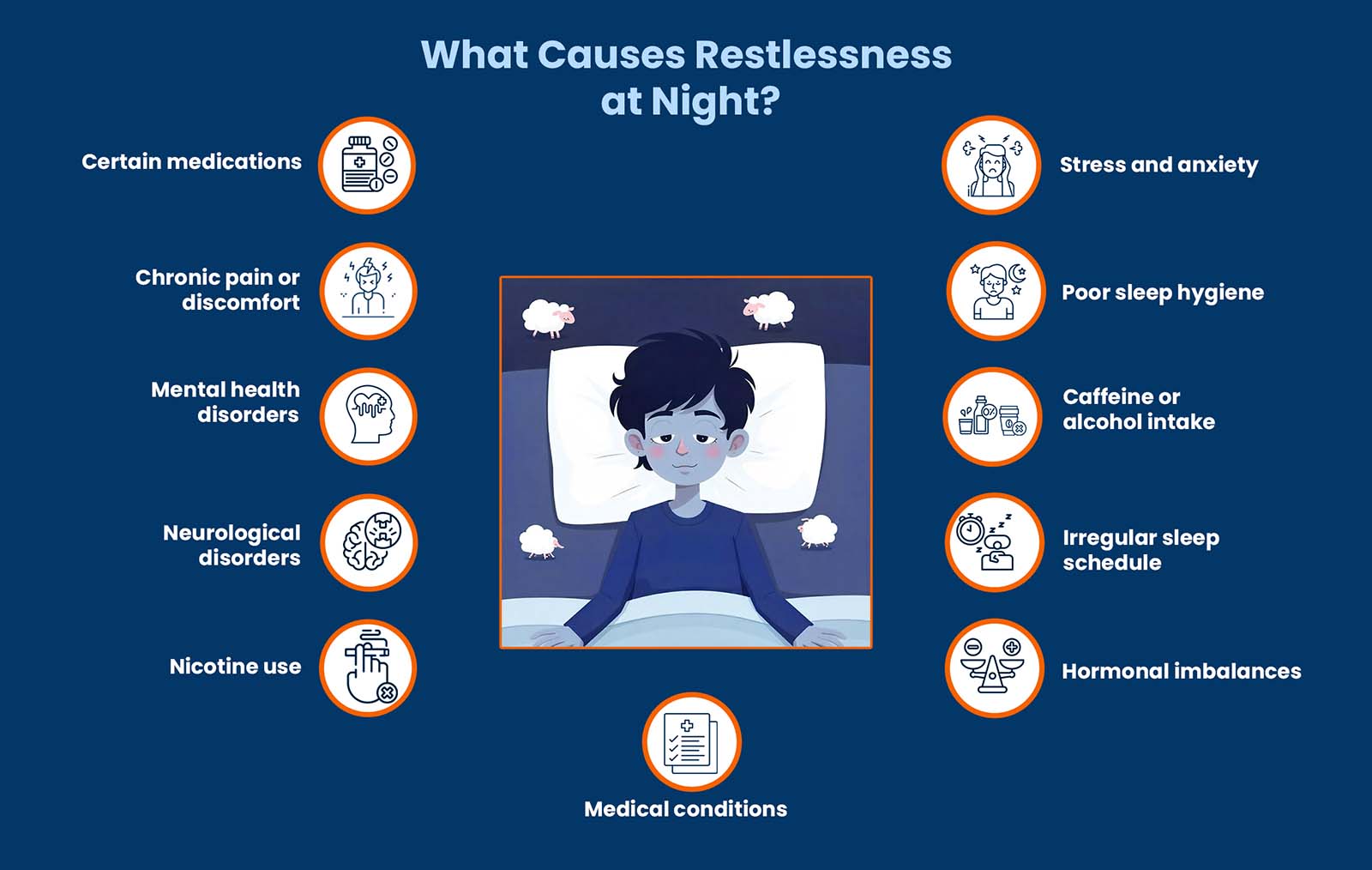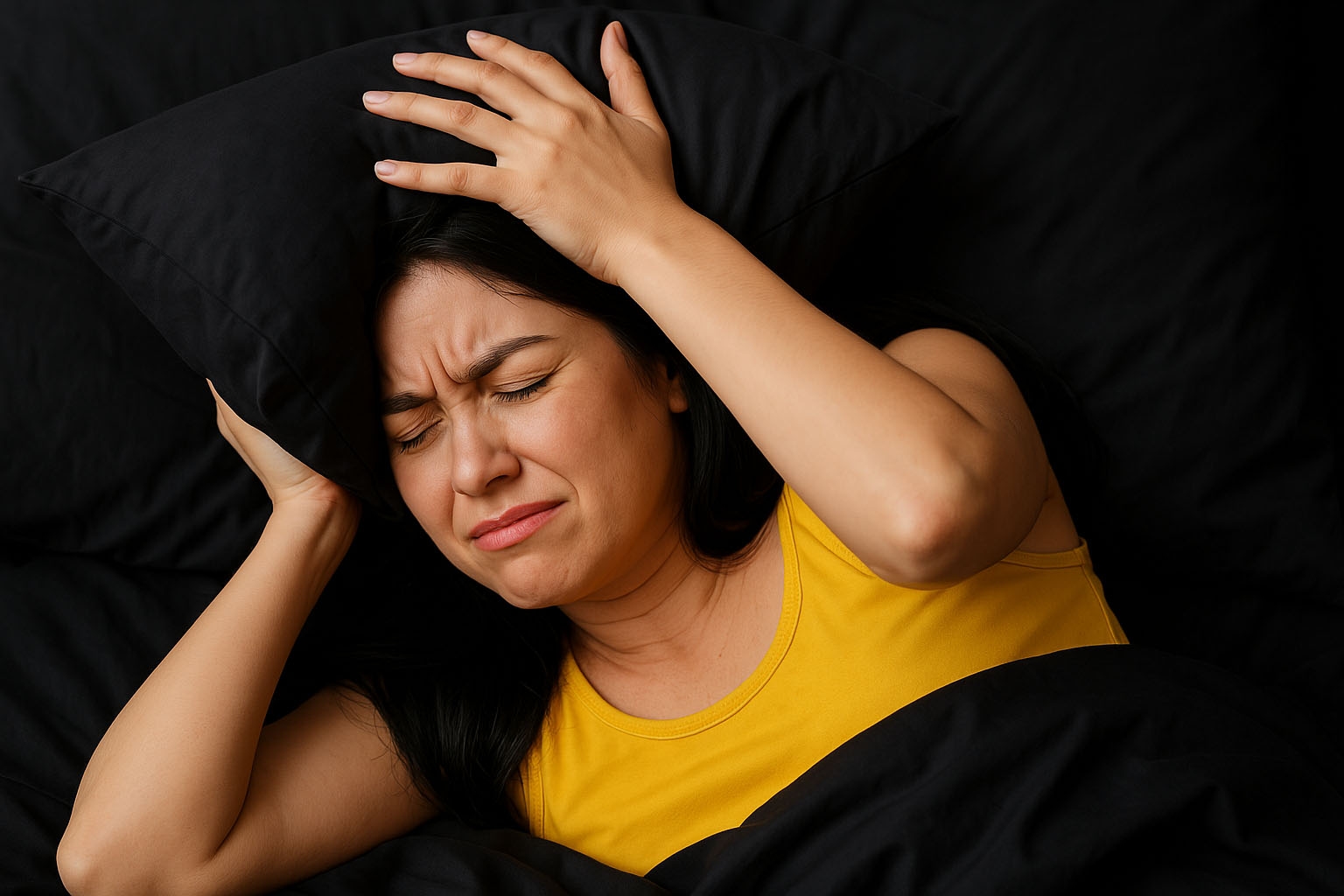It's not uncommon for people to feel restless at night, even if they feel tired in body. The Centers for Disease Control and Prevention (CDC) says about one in three adults in the U.S. regularly don't get enough sleep, and lack of quality sleep often begins with an inability to fall asleep or stay asleep, or feeling as if they cannot stay still in bed. Although it may feel like only a bad night once in a while, restlessness consistently can have a significant impact on your energy levels, focus, and mood.
A recent study published in Sleep Health Foundation also found that upwards of 35% of adults report experiencing insomnia symptoms, and restlessness can be a typical early warning. There are many potential causes, from stress, diet, and medical conditions to lifestyle habits. If you find yourself awake at night without any awareness of why, it might be best to investigate what might be going on. In this blog, we'll go through the most common contributors to restlessness at night and how those might be impacting your sleep.
What Does the ‘Restlessness’ Mean?
When we discuss nighttime restlessness, we mean a state in which the body and or mind are unable to settle down during sleep. There are many ways this type of unrest can present itself. Some folks manifest restlessness by tossing and turning in bed and struggling to find a comfortable position. Others wake up and have a harder time learning or will spend several hours in bed, only to feel like they are not able to "switch off" once asleep.
Restlessness doesn’t always mean being fully awake—it often includes:
- constant movement - leg twitching, shifting positions, or repeatedly waking up without a clear reason.
- racing thoughts,
- anxiety, or
- physical discomfort, which makes it hard to stay still or fall into a deep sleep.
Over time, this can manifest in the body not experiencing the deeper, restful stages of sleep and cause daytime fatigue, irritability, and impaired focus.
Regular Causes of Restlessness At Night
Nighttime restlessness has a variety of sources: some physical, some mental, and often both. Knowing the common reasons can help you understand what's preventing you from resting.
1. Poor Sleep Environment
A room that’s too bright, noisy, hot, or uncomfortable can make you restless. Even the faintest light or noise when you're trying to sleep, so you can never fully relax into the deeper stages of sleep.
2. Irregular Sleep Schedule
Having a different time for going to bed and waking up every day can confuse your internal body clock. The more inconsistent you are, the more trouble you'll have falling asleep, and you'll certainly wake up several times in the night. Here are a few tips to maintain a good sleep schedule.
3. Caffeine, Alcohol, and Heavy Meals
Caffeine and alcohol within a few hours of sleep can throw off your body's sleep cycle. Caffeine is considered a stimulant, and alcohol, which at times can make you feel drowsy at first, will cause you to wake up, at least in the middle of the night. Also, large meals and spicy foods close to bedtime can make you uncomfortable and restless.
4. Lack of Exercise
Inadequate daily movement can inhibit our ability to feel sleepy or have the restfulness we crave in sleep. Light to moderate exercise can help regulate sleep, while a completely inactive day may leave you feeling restless.
5. Screen Use Before Sleeping
Experiencing blue light before sleeping can inhibit your body's release of melatonin, which is a hormone that signals sleep. The blue LED light emitted by phones, tablets, and TV screens sends confusing signals to our brains, erroneously letting it believe it is still daytime, which will make it harder to go to sleep peacefully.

Medical Causes
In some circumstances restlessness during sleep is not solely related to our lifestyle or stressors, it may have the ability to be linked back to other medical conditions. While some of these conditions are inconvenient and perhaps treatable, being able to pursue identification of these may be critical for finding appropriate treatment and establishing a healthy sleeping pattern.
1. Restless Legs Syndrome (RLS)
RLS is a neurological disorder that is characterized by a restless feeling in the legs, often described as crawling or tingling, or even an itchy feeling. These feelings create an overwhelming sense of urgency and a need to move the legs. It usually occurs when a person is resting or trying to sleep, and Restless Legs Syndrome often brings frequent awakenings and a strong desire to rise.
2. Sleep Apnea
Sleep apnea is a common condition where breathing stops and starts repeatedly during sleep. This negatively alters a person's normal sleep cycle and causes a person to wake up abruptly during the night, sometimes gasping for air, i.e. sleep apnea. The result is fragmented sleep and excessive tiredness throughout the day.
3. Chronic Pain
Almost any condition causing chronic pain, such as arthritis, fibromyalgia, or back problems, can create constant pain and discomfort during nighttime. The pain of chronic issues often causes frequent tossing and turning, or even waking up several times throughout the night.
4. Gastroesophageal Reflux Disease (GERD)
Gastroesophageal reflux disease (GERD) is a condition that causes stomach acid to flow back into the esophagus, leading to heartburn and uncomfortable sensations. Symptoms can worsen when lying down, leading to restlessness and interruptions during sleep.
5. Mental Health Disorders
Mental health disorders such as depression, anxiety disorders, or other mental health issues can also be a cause for sleep disturbances. In these instances, people may experience varying emotions such as racing thoughts, nightmares, or insomnia, which overall make for restless nights.
6. Hormonal Changes
Hormonal fluctuations, such as during menopause, pregnancy, or thyroid changes, can interfere with sleep patterns and cause restlessness. Night sweats, hot flashes, or mood swings may create barriers to staying asleep.
Medications That Might Cause Restlessness
Some medications can prevent your ability to relax and even your chance of getting a good night's sleep. If you are having problems with restlessness, consider whether any medicines you are taking may influence the quality of your rest or sleep.
- Stimulants (e.g., caffeine, decongestants, ADHD medications like Adderall)
- Antidepressants (especially SSRIs and SNRIs)
- Steroids (corticosteroids for inflammation)
- Beta-blockers (for high blood pressure and heart conditions)
- Thyroid hormone replacements (if dosed incorrectly)
- Asthma inhalers and allergy medications
- Weight-loss drugs with stimulating effects
Final Thoughts
Restlessness at night isn’t uncommon; everyone has experienced it at one time or another. There is no reason to be concerned about your restlessness unless it happens frequently. The reasons for feeling restless could be due to your lifestyle, sleep environment, health conditions, or medications. Understanding the possible causes is the first step towards improving your sleep quality. The harm of poor sleep does not just affect your next day, and extended poor sleeping time can lead to long-standing effects on your health and wellbeing.
If you are experiencing restlessness, you may want to evaluate your daily routine, sleep environment, and medications. If you continuously experience restlessness and have severe symptoms, consult with a healthcare professional to see if there are any underlying issues and what treatment options exist. Taking action to combat restlessness can lead to improved sleep, more energy, and the ability to live a healthier, well-balanced life.












